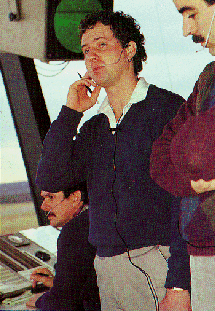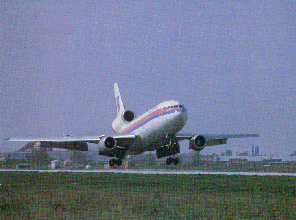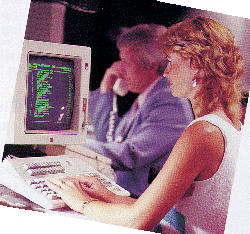 |
|||||
| Home | Research | For Teachers | HISTORY Level 1 Level 2 Level 3 |
PRINCIPLES Level 1 Level 2 Level 3 |
CAREER Level 1 Level 2 Level 3 |
| Gallery | Hot Links | What's New! | |||
| Web Administration and Tools | |||||
 |
|||||
| Home | Research | For Teachers | HISTORY Level 1 Level 2 Level 3 |
PRINCIPLES Level 1 Level 2 Level 3 |
CAREER Level 1 Level 2 Level 3 |
| Gallery | Hot Links | What's New! | |||
| Web Administration and Tools | |||||
![]()
The following is a list of Technical career categories:
Flight Service Specialists
Air Traffic Controllers
Ground Radio Operators and Teletypists
Meteorologists
Air Transport Pilots
Special Purpose Flying
Aviation Teachers
Aviation Safety Officers
Flight Simulator Operators
Flight Examiners
Flight Instructors
Airframe Mechanics
Powerplant Mechanics
Airframe and Powerplant Mechanics
Engineering Maintenance Directors
Avionics Technicians
Mechanics: Line Maintenance, Overhaul
Dispatchers
Flight Service Specialists work for the Federal Aviation Administration. They help pilots plan and carry out flights.
| Air Traffic Controllers control and advise pilots in and around the airport. They inform pilots by radio about wind, weather and location of other airplanes. |  |
Ground Radio Operators and Teletypists send messages that people on the ground want to get to planes in flight. They are the link between dispatchers, air traffic controllers, and pilots.
Meteorologists are weather specialists. They assist the airlines and general aviation pilots by giving detailed and frequent information about weather.
Air Transport Pilots fly people and cargo at scheduled times over predetermined routes. They fly only between air carrier airports. They require three kinds of pilots, the captain, first officer and second officer. All three have specified duties during flight.
Special Purpose Flying involves the use of aircraft for many purposes such as:
|
 |
Aviation Teachers teach aviation and related subjects in over 200 junior colleges and universities and 2,000 high schools.
Aviation Safety Officers conduct meetings for pilots on air and ground safety.
Flight Simulator Operators run machines which look like aircraft cockpits. These machines assist flight instructors in the training of their students.
Flight Examiners issue certificates to students who successfully pass written and flight examinations. They fly on the airlines to make certain that pilots observe the Federal Aviation Administration rules.
Flight Instructors teach people how to operate airplanes. They teach the basics of flying leading to the private pilot's license. They also help pilots earn advanced flight ratings.
Airframe Mechanics are trained to test, repair, inspect and overhaul the frame of an airplane. The Federal Aviation Administration requires these mechanics to pass a special examination and receive a license.
Powerplant Mechanics are trained to test, repair, inspect and overhaul the engines of an airplane. The Federal Aviation Administration requires these mechanics to pass a special examination and receive a license.
Airframe and Powerplant Mechanics are known as A & P's and are required by the FAA to be licensed to work on both the airframe and Powerplant of an airplane. These types of mechanics are very much in demand by the airlines and general aviation.
Engineering Maintenance Directors are persons skilled in the maintenance of the aircraft who have management abilities. They are in charge of mechanics and other maintenance people.
| Avionics Technicians check, reset and rebuild the navigation and communication instruments of the airplane. |  |
| Dispatchers schedule flights to and from a given airport. |  |
Send all comments to ![]() aeromaster@eng.fiu.edu
aeromaster@eng.fiu.edu
© 1995-98 ALLSTAR Network. All rights reserved worldwide.
Updated: February 25, 1999